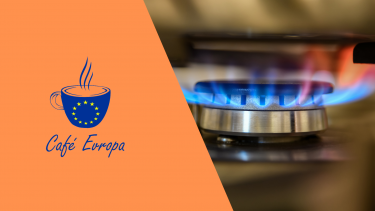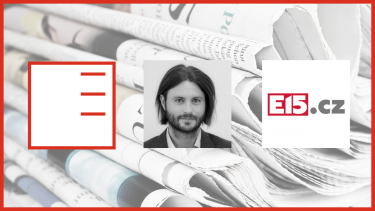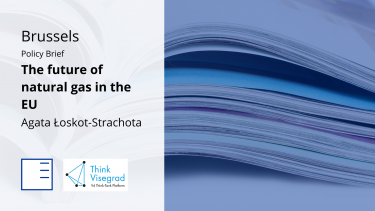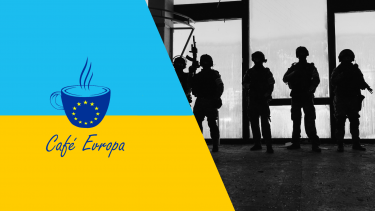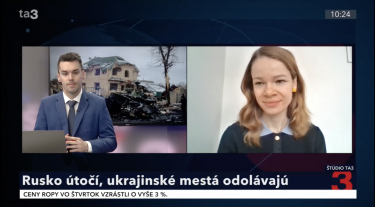INVITATION: DIGITAL WORLD – A BOON OR A FRONTLINE?
EUROPEUM Institute for European Policy and The Centre for European Perspective – CEP invite you to a hybrid event: DIGITAL WORLD – A BOON OR A FRONTLINE? The event will take place on Tuesday, 5 April at 10:30 in Prague Creative Centre, room 219, or online on our Facebook page.
Show moreINVITATION: Café Evropa online: The future of European energy - how to ensure stable and clean energy sources without Russia?
We would like to invite you to the Café Evropa debate on 21 March at 17:30 on the topic "The future of European energy - how to ensure stable and clean energy sources without Russia?". The Russian invasion of Ukraine has, among other things, further fuelled the question of energy security in the Czech Republic and the EU and the future of energy in our country. The current security situation points to the need to diversify energy sources as soon as possible, i.e. to secure energy supplies from different regions and countries in order to avoid excessive dependence on Russia. There are also views in the public debate that coal extraction could be temporarily increased, which would enable some countries to cover any shortfalls in resources. Is a complete or even partial halt of Russian gas supplies to the Czech Republic and the European Union a realistic option? What impact would this have on our energy security? How much further increase in energy prices can we expect in this case? How should EU countries react and help households and industry cope with the expected increase? Could a possible temporary increase in coal extraction mean a return to fossil fuels and the end of the EU's climate ambitions? Or could the current problematic situation further accelerate the energy transition?
Show moreReport: EU – Pacific Talks: H2 – Hydrogen Hype
David Plhák wrote a report from the EU - Pacific Talks debate on: H2 - Hydrogen Hype. The debate outlined the current state of the hydrogen economy and its role in the EU, Czech Republic and Japan's efforts to achieve climate neutrality and reduce energy dependence on hydrogen.
Show more PDFRádio Slovensko: Is there a room for diplomatic dialogue with Moscow when missiles are still falling on Ukrainian cities?
Žiga Faktor, a research fellow from our Institute and the head of our Brussels office, together with Irena Jenčová from the Euractiv portal, spoke in a Radio Slovakia discussion about sanctions against Russia, the unacceptable demands of the Kremlin, and the search for a way for Europe to replace Russian gas and oil. Will economic pressure force Moscow to come to the negotiating table and declare a ceasefire in Ukraine? Would not greater diplomatic engagement by the United States or China help?
Show more
E15.cz: Five scenarios of how the war in Ukraine will end. Russia's internal stability will decide, experts say
Christian Kvorning Lassen, Deputy Director and Head of Research at our Institute, together with other experts, spoke to the online news server E15.cz and described possible scenarios of how the war in Ukraine could end. The article thus describes five possible scenarios - both the more optimistic ones for Ukraine and the less favourable ones.
Show morePolicy Brief: The future of natural gas in the EU
A Policy Brief on the future of natural gas in the European Union was produced during a study visit to the Brussels office of Think Visegrad. The author of the brief, Agata Łoskot-Strachota, focuses on the current market crisis, which has raised questions about the role of gas in the decarbonisation process, as well as the cost and security of supply, and highlights the need for a common gas strategy that is in line with the objectives of the Green Deal, but also responds to short-term challenges.
Show more PDFDeník N: The Green Deal is more important than ever, says the Decarbonising Automotive Transport conference
Our researcher Michal Hrubý attended the conference on Decarbonisation of Automotive Transport where he took part in the debate. We are on the threshold of a decision about the future of Czech car transport. Demand for electromobility is growing exponentially globally, as is the development of battery technology. In the future, these could become value-added products that will kick-start our economy and return the Czech Republic to a leading position in the investment environment. According to representatives of the European Parliament, the state administration, the automotive industry and independent experts on electromobility, it is now important for the Czech Republic to leave the scepticism of change behind and start educating and preparing for the decarbonisation of automotive transport. Not only for the environmental impact, but especially for the future competitiveness of the sector. This was stated in a debate at the Decarbonisation of Automotive Transport conference organised by EUROPEUM Institute for European Policy on Tuesday 1 March.
Show more
INVITATION: Café Evropa online: Russian aggression in Ukraine - can we stop Putin?
We would like to invite you to the next debate within the Café Evropa series, this time on the topic: " Café Evropa: Russian aggression in Ukraine - can we stop Putin?". The debate will take place on 2 March at 17:30. What will be the impact of the joint actions of the EU and NATO countries on Russia? Are the arms supplies sufficient or should direct military support be included? Can economic sanctions help Ukraine in any way now, or is this more of a step that will only become apparent in the longer term? Is the collapse of the rouble and the entire Russian market realistic? How can China influence Russia's current economic situation? And how will these sanctions be felt by the Russian population?
Show moreEURACTIV: You're either with us or against us. Serbia is gambling with its future in the EU
Our researcher Jana Juzová commented for Euractiv on how Serbia's ambiguous position is affecting its EU accession process. Serbia is one of the few European countries, that has refused to join the anti-Russian sanctions, even though it has supported Ukraine's territorial integrity and promised to help refugees. The role taken by this Western Balkan country is not surprising, as it has been teetering between the EU and Russia for the last decade. In the accession process, according to our researcher, Serbia's current position towards Russia is not the biggest problem, as Serbia also faces other shortcomings for EU integration.
Show moreTA3: Ukraine demands guarantees, wants to be in the EU
Our Associate Research Fellow Zuzana Stuchlíková spoke in the TA3 about the possible impact of Ukraine's accession to the European Union, what are the real chances of accession and what view other member states have on it.
Show more
Staroměstské náměstí 4/1
Prague 1 - Staré Město
110 00
tel.: +420 212 246 552
email: europeum@europeum.org
https://www.europeum.org

